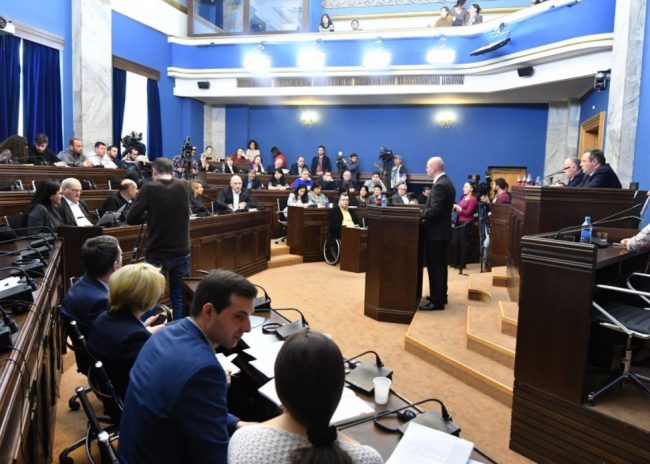

 Georgia’s Parliamentary Committee on Healthcare and Social Issues has given the green light to an amended version of new labour safety reforms. The government has come under increased pressure from labour groups to pursue ‘more effective’ reforms.
Georgia’s Parliamentary Committee on Healthcare and Social Issues has given the green light to an amended version of new labour safety reforms. The government has come under increased pressure from labour groups to pursue ‘more effective’ reforms.
The latest amendments would increase the fines for employers violating safety rules, but these would still only apply to a handful of ‘hazardous’ sectors. Labour inspectors will also still be unable to inspect workplaces without employers’ prior consent.
Left-wing student group Auditorium 115 staged a protest after the 15 February committee sitting ended, and waved papers with ‘1,209’ written on it. This is the number of workers killed or injured at work in Georgia since 2011.
The Ministry of Labour presented the initial version of the bill to Parliament after four miners died in a coal shaft last May. It passed its first parliamentary hearing in November, but rights groups say the reforms have since been watered down.
New changes
According to a press release from parliament, the government’s main aim with the bill is to allow the authorities to inspect high-risk workplaces.
Netgazeti quoted Shalva Tadumadze, the Government Parliamentary Secretary, as defining 11 hazardous sectors of the economy that would be covered. These were: transport, light industry, furniture manufacturing, glass production, heavy industry, the oil and gas industries, metallurgy, mining, construction, electricity, and chemical production. The list can be amended later, according to him.
The initial version of the bill would have applied the regulations to all ‘heavy, harmful and hazardous’ fields of labour, but the updated version says only the fields with ‘increased dangers’ will be affected. The cabinet will decide which out of these 11 they classify as such. The changes were reportedly initiated by the Ministry of Economy.
The changes have met backlash from certain groups, with the Human Rights Education and Monitoring Centre (EMC) claiming the decision has not been properly justified.
Tadumadze told Business Media Georgia that from September 2019, parliament could begin working on labour safety reforms which would include all workplaces, not only hazardous ones.
Increased fines
In the amended bill, fines will range from ₾100–₾50,000 ($40–$20,000). The sanctions are categorised into three types, and will depend on the size of an enterprise.
For repeat offences, the fines will be doubled, Netgazeti reported.
Head of the Committee Akaki Zoidze said that ‘nobody should have any illusion that the day after adopting this law […] we will have an ideal system of labour safety’. According to him, this requires a number of reforms, which he vowed the Social Issues Committee would work on.
He said it was a ‘legitimate interest’ of parliament to create jobs, but that these jobs ‘should not be a threat to our citizens’ health and lives’.
The bill will now go to parliament’s plenary session for the second reading; the dates for the second and thirds readings have yet to be set.









